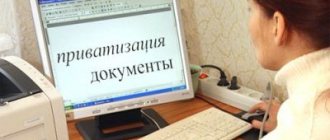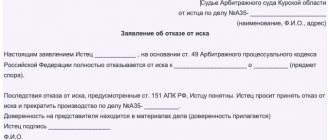Determining the need to improve living conditions
According to the provisions and norms of the relevant code of the Russian Federation that have entered into legal force, one of the key factors that allows you to get in line is the size of the living space actually belonging to one person.
By law, this size must be fifteen or more square meters. These figures may vary depending on the region. If each family member is provided with the required number of square meters, it will not be possible to stand in line for a change in living conditions. For example, if four people live in a 60-meter apartment, two of whom are father and mother, and the other two are children, then before the changes to the Housing Code came into force, a child who had reached the age of majority could stand in line for a change in living conditions on the basis lack of personal ownership rights to a specific apartment. Today, given the fact that each family member has 15 square meters, an adult son or daughter of a tenant will not be able to qualify for housing.
The procedure for placing on the waiting list in the event of divorce between spouses is regulated in a similar way. If spouses have a common apartment with an area of 30 square meters or more, then it will not be possible to improve living conditions at the expense of the state. If mother and son live together in the same room, this rule does not apply. An adult son living with his mother in a one-room apartment of any size can join the queue.
Please note that today we are summing up the total number of square meters that belong under ownership rights to a specific family within the same city or locality, including apartments and houses owned by relatives - a spouse, parents of a spouse, joint children , other related persons living in the same territory and leading a joint household. For example, none of the members of a family consisting of three people living in an apartment of two rooms with an area of 40 square meters has the right to improved living conditions if in the same locality one of them has a residential house, apartment or room, and with taking into account its area, each person accounts for more than fifteen square meters.
Who can apply for improvements?
According to the current housing legislation, there are categories of citizens who have the right to apply for registration as a person in need:
- Low-income citizens
Recognition of a citizen as such occurs by assessing his income and property, which is subject to taxation, and varies depending on the subject of the Russian Federation,
- disabled people,
- war veterans,
- minor children and orphans,
- heroes of the USSR, heroes of the Russian Federation,
- rescue workers, police officers,
- citizens who are not social housing tenants and members of their families;
- citizens who do not own living space and are not part of the family of those who do;
- citizens who are not provided with the minimum living space per person according to the norm;
- citizens living in the same living space with a person who has a chronic illness that prevents the possibility of living together with him.
Procedure for registering adult children
According to the conditions used earlier, a child who had reached the age of majority could receive a separate apartment if the family was registered. Thus, the queue was divided not after reaching adulthood, but at the time the child’s parents or guardians entered the queue. Today the situation has changed, and the division of priority is carried out after reaching the age of majority or entering into legal marriage. Queue accounting begins from this moment. This amendment is relevant if the young person submitting the application does not have ownership rights to any housing.
If children born after divorce or adopted do not have their own housing at the time of filing their application, they also have the right to decent living conditions. This rule applies if children do not have square meters in the apartment or house of their parents or guardians when submitting documents independently.
Before the amendments came into force, the fact of reaching adult legal age was the basis for placing on the waiting list for the provision of housing property for each person living in a communal apartment or social apartment. Today, additional documents are required confirming that the applicant has less than fifteen square meters.
According to modern standards, citizens who have the right to receive social housing can also apply for the allocation of space in the amount of 15-20 square meters per person, with the exception of those square meters that are owned by the applicant at the time of submission of documents.
For example, if a father, mother and child apply for a social apartment, then the housing criteria for them is 45-60 square meters of area. If any of them owns a room or house with an area of 20 square meters or more, this family can receive social housing with an area of up to 25-40 square meters.
Composition and family members
The purpose of this block of documents as part of improving housing conditions is to confirm the size and composition of the family, the relationship of citizens with each other. For this you need:
- passports of all family members - you need to make copies of all pages, even blank ones;
- documents on marriage/divorce (if the spouses are divorced, this fact also needs to be confirmed);
- birth or adoption certificates of children;
- reference information about family composition - it indicates the degree of relationship, age, full name of all family members, the document is issued by the passport office of the MKD;
- an extract from the house register - needed if the family lives in a private house.
Attention! Additionally, they may ask for SNILS and TIN for each family member.
How to get on the waiting list for housing?
If there are legal rights to be included in the queue to improve housing conditions, a citizen of the Russian Federation must perform a number of mandatory actions. First of all, you need to collect the necessary documents and submit them to administrative officials at the place of registration of housing. Simultaneously with the documents, an application is submitted asking for improvement of living conditions. The documents and application are reviewed by authorized persons, and the applicant receives a written response. This response confirms the fact that the applicant has been registered and included in the list of those applying for improvements in housing conditions. In case of refusal, the letter must contain reasoned arguments and grounds for refusal.
In order to avoid possible refusal and achieve a positive result when applying, it is necessary to cooperate with a qualified lawyer. Each lawyer of the Moscow Municipal Bar Association is an expert in the legal field in question and offers a full range of services to clients. This:
- Initial consultation and objective assessment of the grounds for requesting improvements in housing conditions at the time of filing the application.
- Assistance in collecting documents that are necessary for registration and joining the queue based on various government programs.
- Appealing decisions made by the commission in case of refusal to be included in the list of candidates.
- Support at the stage of receiving subsidies, issuing an owner’s certificate and other documents.
- Submitting official requests and conducting the necessary examinations to confirm the right to resettlement.
- Other types of legal assistance.
Contacting a lawyer in a timely manner will help you save time and get the best possible result. MMCA lawyers are competent to assess and implement various legal grounds that have a direct impact on ensuring decent living conditions. Sign up for a consultation with a lawyer now and get answers to any questions you may have.
Supreme Court explains
Situation from practice
Andrey Ivanov is a major of the Ministry of Internal Affairs, he served in the police for 15 years. For a long time he lived and was registered in his mother’s apartment; he did not have his own living space. Andrei’s son was also registered and lived there. It's a bit cramped.
An attempt to improve conditions
Andrei decided to leave his mother’s apartment in order to register and get his own housing. A couple of months after deregistering himself, he applied to local authorities to recognize him as in need of improved housing conditions. The answer did not take long to arrive, and Andrei was refused. To justify the refusal, a reference was made to the fact that the citizen did not provide a document confirming his place of residence for recent periods.
The refusal seemed unfounded to Andrey, and he went to court to appeal it.
Case in court
The court sided with the major and ordered the department to register the family. In support of its decision, the court explained that Andrey provided all the necessary documents that are sufficient to receive the appropriate “housing” payment. The court also added that failure to provide such documents still does not limit the applicant’s right.
Andrei’s mother, according to the court, is not a member of his family, since their cohabitation is not confirmed by anything. Thus, the moment of Andrei’s discharge from his mother’s apartment, where he lived all the time and according to the law there were enough square meters per person, was not taken into account by the court at all.
The second instance left the decision unchanged.
Supreme Court refusal
The situation changed when the department filed a cassation appeal to the Supreme Court.
When considering the case, the court found it erroneous to believe that Andrei, his son and mother are not one family. The Housing Code clearly establishes a refutation of this in Part 1 of Art. 31.
In order for Andrei and his son to be recognized as members of the mother’s family, it is only necessary to establish the fact that they live together. There is no need to prove that they helped each other financially and ran the household together.
The Supreme Court undertook to check the necessary circumstances and found that Andrei, by deregistering himself and renouncing the right to use his mother’s apartment, deliberately worsened his living conditions. Man made himself needy.
According to Part 8 of Art. 4 of Law No. 283-FZ, such actions of a citizen serve as a direct reason for refusal to register.
The decision of the previous authorities was overturned. Andrey took his case for a new trial.
Services for citizens and organizations
| Oral (face-to-face) legal consultation with the duty lawyer with the study of documents submitted by the client | from 2,400 rub. |
| Oral (face-to-face) legal consultation with an industry specialist lawyer with the study of documents submitted by the client | from 4,800 rub. |
| Study by a specialist lawyer of the case materials presented by the client, judicial practice in the case, development of the legal position of the defense (using professional legal resources), outside the framework of an oral consultation | from 1,200 rub. |
| Departure of the duty lawyer to the principal | from 3,000 rub. |
| Preparation of the primary written legal document (application, complaint, petition, legal opinion) | from 7,000 rub. |
| Oral (face-to-face) legal consultation from an industry specialist lawyer without studying documents | from 2,400 rub. |
| Oral (face-to-face) legal consultation of the duty lawyer without studying documents | from 1,200 rub. |
| Hourly wages for a specialist lawyer for comprehensive protection of the client’s rights | from 2,500 rub. |
| Lawyer's request to government institutions and organizations | 4,800 rub. |








